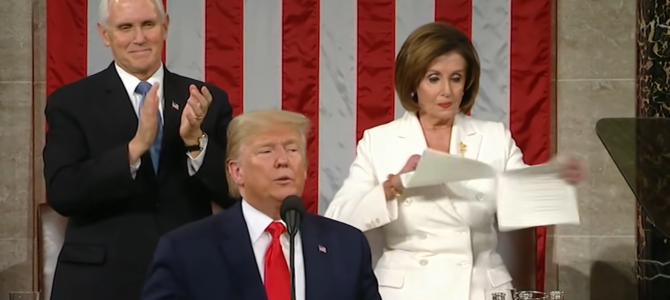
Bickering over a presidential speech to Congress this year began more than a week before the event. On April 19, Republican lawmakers wrote to House Speaker Nancy Pelosi, D-California, requesting she postpone Joe Biden’s first presidential speech to Congress until the House of Representatives is in session. (The House will be conducting committee work during the week of April 26-30.)
Given widespread vaccination on Capitol Hill, they also asked Pelosi to increase capacity limits from a planned cap of 200 attendees to let all interested members attend the April 28 address.
Republican concerns about the timing of Biden’s speech are valid. But rather than rescheduling the address, they should seek to end the practice of presidents addressing Congress—both to reassert the primacy of the legislative branch, and to end political set pieces that often devolve into partisan food fights.
Shouting Outbursts And Ripped Speeches
Pelosi’s stunt at the end of last year’s State of the Union address—in which she tore up a copy of President Donald Trump’s speech—represented merely the latest case the message has become a spectacle full of political antics and poor decorum.
Two years ago, Pelosi asked Trump to postpone his address during the lengthy government shutdown, claiming that hosting the speech would present security concerns since federal workers remained on furlough. Her claims seemed questionable at best; most security personnel were not furloughed, working through the shutdown as essential employees. Trump’s address eventually occurred on Feb. 5, a week after its originally scheduled date and after the shutdown ended.
The State of the Union has become a partisan brawl on both sides of the aisle. Members of the president’s party cheer obnoxiously, and members of the opposing party jeer obnoxiously. Pelosi’s theatrics at the end of last year’s speech only served as a climax to Democrats chanting and jeering during earlier portions of the address, and went further than her infamous clap during the 2019 address.
Lest one think the juvenile behavior comes only from Democrats, Republicans too have engaged in similar outbursts under a Democrat president. During Barack Obama’s September 2009 speech to Congress on health care (technically not a State of the Union message), Republican members stood up with copies of their health-care proposals, protesting Obama’s claim that opponents of his plan wanted to do nothing.
The night culminated in Rep. Joe Wilson, R-South Carolina, yelling “You lie!” to Obama’s claims that Obamacare would not provide coverage to illegal aliens.
On substance, Wilson’s primal yell had more than a ring of truth to it—a Senate report later found roughly half a million people with verification issues received Obamacare subsidies—but was still tactless and inappropriate. (Wilson at least had the decency to apologize after his outburst, unlike Pelosi.) In retrospect, it reflected a coarsening of behavior during the State of the Union by members of Congress on both sides of the aisle.
No, The Constitution Doesn’t Ask a Primetime Address
While the State of the Union derives its name and mandate from the Constitution, that document nowhere requires the president to deliver a message in person, or annually. Rather, Article II, Section 3 states the executive “shall from time to time give to Congress Information of the State of the Union.”
For most of the nation’s history, such information came via annual written messages to Congress rather than in-person addresses. George Washington and John Adams delivered their messages in person, but Thomas Jefferson abandoned the practice, thinking it too similar to the Queen’s Speech—the practice where the monarch in Britain reads out her government’s agenda from the throne during the State Opening of Parliament.
For more than a century, presidents followed Jefferson’s tradition of written messages. Woodrow Wilson restarted the in-person address to Congress, but ill health following his stroke meant he delivered his 1919 and 1920 messages in writing. Two of Wilson’s successors, Calvin “Silent Cal” Coolidge and Herbert Hoover, also employed written messages.
Only since Franklin Roosevelt have presidents regularly addressed Congress every year. In 1965, Lyndon Johnson moved the State of the Union speech to prime time, where it became a major event on the political calendar. The move coincided with the Great Society’s growth of government and a commensurate rise in presidential power—a rise members of Congress, as participants in a co-equal branch of government, should seek to thwart, not encourage.
After all, the president proposes, but Congress disposes. So why should Congress spend 90 minutes listening to a president tell them what to do?
Nix the Pep Rally
Republicans should start the process of ending in-person State of the Union messages. House Minority Leader Kevin McCarthy, R-California, should publicly announce an intention to end the practice, giving him a mandate in the event Republicans retake control of the House in next year’s midterm election.
The address has become an opportunity for grandstanding and partisan arguments that deliver little substance, prompt childish behavior from members of Congress, and generate more light than heat. Even the practice of recognizing Americans in the balcony during the address—begun by President Reagan in his 1982 speech—technically breaches the House’s rules of decorum.
(Clause 7 of Rule XVII of the House requires: “During a session of the House, it shall not be in order…to introduce to or to bring to the attention of the House an occupant in the galleries of the House. The Speaker may not entertain a request for the suspension of this rule.”)
Too many lawmakers have used presidential addresses to beclown themselves and the institution they represent. Congress should do all of us a favor by depriving themselves of the opportunity to continue.







